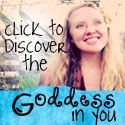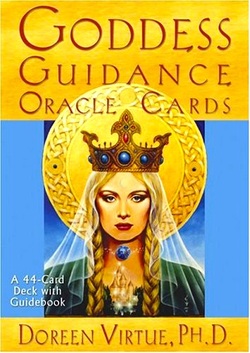 I have a confession to make, and it's one I've been putting off for a long time.
I've been experimenting...
With oracle cards.
The Doreen Virtue Goddess Guidance cards, to be specific, with the sparkly gold edges the pretty, soothing pictures of gorgeous women. The sweet, "non-threatening" messages.
And okay, okay, I jest. There is nothing wrong with oracle cards - they're lovely! And fascinating! There's so much variety! But I was always a bit skeptical about Ms. Virtue. Not because she's doing it wrong - no one is doing it wrong. But I didn't know if she was for me.
I don't know if I believe in Indigo children, you see. Angels and faeries do incredible things for some people, magickally and spiritually - I've met just as many people who say these are powerful forces you don't want to mess with idly. (I've got no idea how they got such a different set of references.) And then there's Doreen Virtue's Tarot deck, in which she claimed she'd removed anything "threatening" or "scary" - when really, the only thing scary about Tarot is how it might tell you there's things in your life that need a little work. Why would I want to avoid anything that might tell me the truth?
But I kept running into these cards, over and over again. Different readers would pull them to supplement a reading. They were out for display at my favorite occult shop, and I couldn't stop staring at them. And finally, a financial windfall came my way to treat myself to some Amazon goodies, and I put them on the order list.
What strikes me first about these cards is the artwork. It's so lush and also so varied, in different styles and forms of expression that let you really feel the personality of each goddess as the cards express them. You could use these cards meditatively if you like, delving into the details of each image and seeing what stands out to you. Or you could just treat the goddess in each card as a friend and a guide, as the deck encourages you to do. That'd trouble you, obviously, if you come from a faith that views these figures as literal beings who want to be called on and honored in a specific way, but as I'm more from the "facets of the same diamond" camp, I see the cards as having a unique energy that they bring with each individual message.
In general, oracle cards tend to be more specific than Tarot, more on point. That doesn't allow for a reading of more than a few cards, and it doesn't delve into complexity, but it provides an excellent springboard for deeper work. Reflecting on the energy of a single card can provide a lot of journal fodder, or maybe researching the nature of that goddess beyond the surface, learning the deeper aspects of her particular message. (I do wish the guidebook provided a little more insight into each individual goddess, and the legends that informed her message.)
There really is a lot of variety for "gentle, non-threatening" messages. Ishtar encourages you to set healthy boundaries, and Green Tara tells you that this may be a time to avoid harsh situations or environments. Kwan Yin tells you to be compassionate towards others, but most of all towards yourself. I realized very quickly that giving yourself kind, careful messages doesn't always mean avoiding truths. Certainly a few daily draws have already given me a lot of food for thought. But much like Tarot, it's up to me how deep I choose to go, whether I do the reflective work on what a particular card might mean to me. That provides a bit of extra responsibility on the part of the seeker, but I can't think of anything less coddling than that.
While Tarot's definitely my one true love as far as divination's concerned, I think I can count this experiment a success.
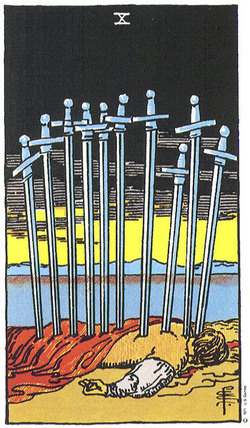 Have you ever encountered something that just makes your eye start twitching and your fingers start drumming? The kind of thing where no matter how much you try to practice non-judgmental bliss, it can sometimes just get to you? Here are a few things I've seen in Tarot that get under my skin.
1. "Gypsy" fortune teller acts. First of all, "Gypsy" is actually a really insensitive word. A lot of people don't know this, so don't feel horrible if you used it up to now or anything. But it's a big-time slur in Europe, and it isn't even accurate, considering it was used to refer to the Romani people because they "looked Egyptian" and no one could be bothered to ask them for the facts. Kind of like "Indians" referring to Native peoples in North America.
The actual semantics aside, if you're reading Tarot more for the entertainment than the counseling angle - and that is totally fine, seriously, as long as you make it clear that's what it is - then you can probably find a sparkly costume to do it in without an accent and the words "cross my palm with silver." Come on, guys. There are like six stereotypes that plays on, and not enough people know what they really refer to.
2. "Bad" cards. People who are reading for themselves tend to do this. A reversal is "bad". The high Swords cards or the Tower are "scary". The Star in the "what to watch out for" position means "you are heretofore advised to throw yourself into a pit of despair and never be optimistic again."
You can read everything super-literally if you want, and I get it if you want the cards to just serve up a slice of truth: "No, the job probably isn't on the way. And also you should probably look out for the bolt of lightning that's going to shake your world up. Just warning you." But I feel like I'm watching a mime box himself in. The problem isn't how you're reading, when you do it this way, it's how you're responding to what it says. I honestly can't, in my heart of hearts, believe your inner guidance and a hand from the Universe is simply saying "Your life will suck right now."
Why is there going to be a bolt from the blue, or a feeling of total despair? You're never helpless in your life, and rarely does anything just happen to you, so determine what's going to show up in your world and decide how you want to feel about that. Adjust circumstances accordingly. Maybe you're not supposed to get the job because there's a better one on the way. Or the sudden, painful revelation will lead to you reinventing your world in a way you'd never have been able to before. Tarot is never just about things happening to you. It's about looking at the road you're on, where it's leading, and if you want to change direction.
3. "They're doing it wrong!" Yes, before you ask, I see the irony here. But seriously, I can't stress this enough. Yes, there are close-minded ways of catering your reading to exactly what you want to hear, or responding to your reading from a place of fear. And that's not good for your learning, or what you get out of reading Tarot. But I'm talking about the methods you pick up and the teachers you choose. There is no end-all-and-be-all as far as that's concerned. The only way you could possibly be "doing it wrong" is if you learn one way, stop there, and refuse to learn anything else. The more information you gather, the more you can decide for yourself what's worth doing and how.
But, here's the real reason for this one: even if you work for years and decide the best way to learn or teach or read the cards or whatever else, please don't be a jerk about it. I have seen a few Tarot experts and instructors call each other out, often by name. I've seen them get judge-y for having a different opinion, teachinga certain way, charging a certain amount of money. I can't think of anything that turned me off faster than watching a seminar from an instructor, and listening to them smugly outline how their teaching was superior to someone else's book.
Everyone learns differently. Everyone responds to the cards differently. Don't limit yourself by stereotypes, by fear, or by inaction. But most of all, don't ever limit someone else by telling them there's only one way to tap into the cards. Tarot is far too elaborate, magical, and full of potential for that.
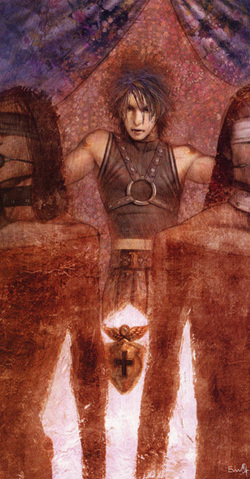 "Absolute power corrupts absolutely."
"The power of man has grown in every sphere, except over himself."
"If you want to test the mettle of a man, give him power."
When you're trying to grow anything of your own - confidence, creativity, self-love or self-discipline - power eventually comes up. What has power over you? What do you have power over, and what should you be able to control?
We're taught, probably for a good reason, to be afraid of having too much power over the world around us. After all, will we really know how to use it wisely? Will we wind up becoming one more person in a long line of bullies, acting only in our self-interests? Or are there institutions that have had power over us for too long, and is this the only way to make a stand?
The Tarot has a lot of cards about power, and in writing my upcoming course, I was surprised at how much crossover there was in just the first six. There's the Magician, who is a magical student, adept, or a stage magician and a shyster depending on who you ask. There's the Emperor, a ruler of men, and the Heirophant, a ruler of our traditions and institutions.
That's to say nothing of the cards that come later, such as the Chariot and Strength, who in many decks come right after each other. To me that's the story of "hard control" vs "soft control", of the times you have to take life by the reins and steer, the times you have to gently tame your inner beasts and demons. It's the Chariot I decided to put up as an illustration for just that reason. And wouldn't you know, my randomizer selected the Lunatic Tarot by Evan Yi Feng. It's one of the first decks I've ever seen where the charioteer isn't pulling horses, or a dark and light Sphinx, but instead is in command of human beings. That's scary - but the beauty of it is when you take a look at that illustration, if it's drawn in your reading, and say "am I exercising control or abuse of a situation?"
There are so many ways to use power, so many ways to define what it even is or where it belongs. That's why to me, power itself isn't a dirty word. We're afraid to call ourselves powerful, to say we have any kind of control. We think it'll make us scary, selfish, or egotistical. But if you don't have power over anything, ultimately it has power over you. You lose any kind of hold you might have over your own life, or the life you want to make for yourself.
"With great power comes great responsibility." And if you don't acknowledge your potential for power, you don't take responsibility for what's happening around you. The beauty of the Major Arcana is that we've been all its figures at one point, or will be someday. We've taken charge or been stuck in tradition, we've fought our problems with gentle grace or by reigning them in. If you don't like the role you see yourself playing, you can understand the part it's playing in your life, and make the choice to transform into another.
And that's the ultimate power over, and responsibility for, your own life. So who will you decide to be today?
I know I stress a lot about Tarot being a tool with no one right method, and how the magic is in you. Today I thought I'd put up a really great YouTube video I found by Jeanne Fiorini of TarotWorks.com, who talks about some of the traditions and superstitions behind Tarot - and how really, like I keep emphasizing, it's a set of tools meant to bring out your inner wisdom.
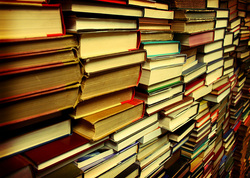 When I was searching through Tarot articles for new information to share with you guys, I stumbled on something that really made me twitchy. In one article geared towards learning to read the cards for beginners, I saw an author saying it might be too confusing for a beginner to read multiple books on the cards, because it might lead to conflicting meanings.
And my first thought was: so what?
Here's the thing about Tarot meanings - they evolve, based on the reader, the deck, the author, the school of thought, the time of the writing. Saying that "conflicting ideas" will confuse you is like saying there's a right answer in the first place. But worst of all, it's like saying you can know too much.
I'm a bookworm and, showing my nerdy roots again, a Ravenclaw at heart. I can't think of anything you could possibly read too much on. You should always, always strive to learn as much as possible - or you'll get locked into one meaning, and unable to be flexible when the need serves. When you're reading for yourself or for someone else, you'll find a meaning for the cards that just doesn't fit the rest of the reading, unless you're willing to think outside the box a little bit or go with your gut. Saying that's "too confusing" is like assuming you can't think hard enough to read the cards in the first place.
There are things to watch out for, of course. Don't scatter your energies and try to tackle too many books at once without absorbing all of them. Don't take anything as gospel without examining why one author feels one way, and another might feel a different way. Don't fail to recognize real, historical facts, because Tarot's genuine evidence-based history shows a lot about where it came from and helps you appreciate how it evolved.
But there's never too much information. There are only ineffective ways of absorbing it.
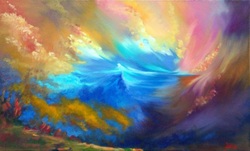 There's so much more to intuitive thinking than just psychic readings and spirit guides. While that's the end goal, developing yourself and your mind so you can be more in touch with the universe, here's a few things developing your intuition can teach you along the way. (image is "Intuition" by Bente Hansen) - Pay attention. The world has so much to say to you if you look around and see what it's telling you. You have so much to say to you, if you only tune in. If you learn to listen, you'll be open to more points of view and more possibilities.
- Slow down. We're so wrapped up in the world around us that we don't always take time to really see and feel what we're doing. Slowing down puts us in touch with our own bodies, with the things we want and need - which means we can take care of ourselves in a more profound way.
- You know more than you think you do. Gurus can point you in the right direction, and you can learn a lot from an outside perspective, but ultimately you're just as in touch with inner wisdom as everyone else. If you believe you'll see results from trusting your instincts, then you will, whether that's achieving your heart's desire or learning more about yourself to make it happen.
- The world is out to give you good things. Really. Even when everything is going horribly. There are no "bad" cards in Tarot, and there are very few 100% "bad" events in life. Our mistakes and our tragedies are tools to learning and developing into something greater than we are. Listening to your intuition means you have an internal guide all the time telling you how and why that is, and it makes the true lessons of the moment far easier to access and believe.
- You are magic. Listen to your intuition, and you'll realize all the miraculous things you've seen in movies are already part of you. As you unlock more and more of your own psychic potential, you'll realize that all the incredible things you ever wanted to do were already there to begin with, waiting for you to bring them out. Will you have natural talent to be an expert at everything? No. But you'll have access to it - to learning lessons from it, tapping into it, and growing from it. And you can make anything you want a part of the magic of your world.
"And you who seek to know Me, know that the seeking and yearning will avail you not, unless you know the Mystery: for if that which you seek, you find not within yourself, you will never find it without.
For behold, I have been with you from the beginning, and I am That which is attained at the end of desire." - The Charge of the Goddess, Doreen Valiente
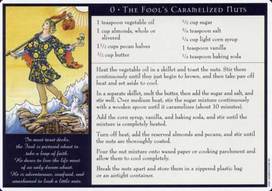 One of the many awesome things about Tarot is just how diverse it is. Even when a lot of what's out there is copying the familiar images of the Rider-Waite Tarot, its variations are like giving a new spin to a familiar friend. And when Tarot does step out of that box? There's a whole list of things you can discover. Here's a few on my wishlist. - Astrology. The Golden Dawn and other esoteric organizations found that with a tiny bit of wiggling, Tarot corresponds to astrology and makes a pretty excellent teaching tool. The Celestial Tarot talks about those direct associations, and has some really gorgeous art to help you learn a little about Tarot and the stars.
- Crystals and Herbs. Magickal types love associations, so I'm going to give you a two-for-one here. The Crystal Tarot links Tarot to gemstone therapy, and if you want to learn herbcraft, there's a Tarot for that too.
- Fairy Tales and Myths. Modern Tarot interpretations are all about archetypes, and there are some universal archetypes - and some that change based on the time and nation of the telling. Fairy tales? Here, have two decks with tales from all over the world. Religion and mythology? (To be inclusive, let's say one man's myth is another man's gospel.) Arthurian, Celtic, Christian, Greek, Egyptian, Norse, even a well-researched deck about several Native American tribes, the Tarot runs the gamut.
- Recipes. There are two different decks that create recipes based on the cards, one with just the Major Arcana and one with 78 different recipes for an entire deck. And as a bonus? A deck that tells the entire history of chocolate. I'm pretty sure that's something I never knew I always wanted.
- Science. I'm pretty useless when it comes to science and math, but the Quantum Tarot somehow combines Tarot with quantum physics, and that is pretty damn awesome.
Did I leave out any of your favorites? Anything on the same subject with better research? Leave me a comment, I'd love to hear from you!
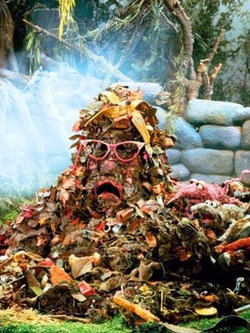 I've been rewatching a lot of Fraggle Rock lately, since my girlfriend with a decidedly HBO-deprived childhood has never seen it. Yeah, yeah, I'm a grown-up and I'm supposed to be above these things. But screw my credibility. There's a lot of simple wisdom in kids' stuff that we don't really remember to touch as adults, and it's Jim Henson, creator of the Muppets and Sesame Street, which should say it all.
And Fraggle Rock? Has to be the most pagan show I've ever seen. A living, breathing system of caves that teach about the interconnectedness of life? A festival where you compose tributes to the full moon? And if you want to teach a newly-minted teenaged Wiccan about why she can't be initiated just yet, just show her "Mokey and the Minstrels".
Then there's Marjory the Trash Heap, the "all-knowing" oracle who pings me quite a bit for obvious reasons. She demonstrates some genuine power and insight towards the end of the series, but mainly Marjory is kind of a shyster - someone who gives you not-quite-groundbreaking sayings or junk objects in the form of talismans. She does claim to be all-knowing, but the Trash Heap doesn't really take payment for her services. She's more than happy to dispense a little bit of cryptic practicality, watch the Fraggles mistake it for deep wisdom, and then let them work out their own problems with this new bit of direction. Her ultimate goal is the goal of all great oracles: to no longer be needed.
And often, the magic works. Anxious Boober feels a surge of courage when clutching a bottlecap inscribed with the words "no deposit, no return." Red and Wembley learn the charm of spilling a bottle of milk and pointedly not crying over it, which gives them the confidence to finally stop worrying and make a plan.
What Fraggle Rock knows, and what Tarot readers know, is that objects and sayings aren't the important thing. There are literal "junk oracles", where you draw discarded odds and ends out of a bag and make observations based on what you find/the meanings you attach. And they're much the same as Tarot's lovely, inspiring, and extremely subjective art. The power is in the reader, whether that's intuition or just plain common sense. It connects us to the magic of the world, taps us into something bigger.
The insights from divination are personal insights, a little nudge in the right direction. They encourage someone to understand the situation and get moving, with the confidence that they knew a little more about themselves and their path than they did half an hour ago. There's a tremendous, often magical power in that. And the greatest power of all, of course, is that you can put a little of your focus and intention into the world - and get a great deal back out of it, no matter what tools you use.
"No deposit, no return."
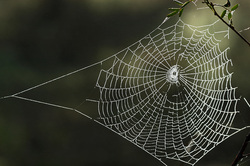 It's nearly a year ago to date. Attending a Lammas celebration, I go to a Tarot reader participating in the festival. She gives me a lot of wonderful advice about the new direction my life is moving towards, and the evolution I'm about to go through. She rightly tells me that in just six months, my entire outlook on life will be different.
She then speaks in extensive warnings about the man who will enter my life that I shouldn't trust with my heart, as he's just looking for a handout. She explains that I'll then meet a man I slowly grow closer to, and enter a more serious relationship with him.
I don't remember the exact details because at that point I had zoned out - when I wasn't exchanging glances with my long-time girlfriend of eight years, who was sitting on the chair right next to me.
As it happens, we did experience a period of growing much closer right around the timestamp this reader gave me. And some male friends were involved, but not in the way the reader said. It's not that this person was completely inaccurate in terms of my reading. She wasn't dead-on, but if you thought outside the box some of her advice was invaluable. But right away she'd made some assumptions about who I was and what I wanted out of life. And that was where she'd lost me.
It's not that this person was homophobic, or a bad person in any way. Really, any time we fail to be inclusive, we're a product of our environment. Ignoring the way our whole society focuses on one kind of person: how many decks that aren't made specifically for gay men feature a heterosexual Lovers card? How many genderqueer or trans people can you find in any Tarot deck? People over a certain weight? People who aren't white, which is thankfully becoming less of a problem, but I still see decks where there's not a single brown, black, or Asian face to be found.
Hell, you could even argue that the very construction of a Tarot deck - the quiet, intuitive High Priestess and the motherly Empress, the power-wielding Emperor and forceful Magician - is rooted in a certain set of gender roles. And Tarot came from the 15th century, so that's to be expected. But when do we challenge that, and what does it do to our preconceived ideas?
When you read for strangers, even if you're divining their lives, it's important to not assume the way those lives work. Even if we're not licensed therapists, a lot of us consider ourselves to be in service positions. That means we're meant to illuminate and empower the lives of our clients - and we can hardly do that when we don't realize a client is in a poly relationship, or asexual, or only feels female some of the time. It's not really our business to ask, but it's our job to know that these are possibilities - and that if we're operating in the web of life, sometimes there are strands we never even imagined we'd land on.
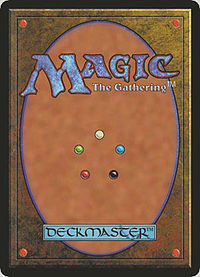 You know how some people get brilliant flashes of inspiration in the shower? My completely un-brilliant flash went like this:
By all evidence, history shows us that Tarot originated in the mid-15th century as a card game called tarocchi. Each card in the Major Arcana represented a different rule that applied to the actual game. There's a lot of discussion about whether the Tarot also hid certain pagan ideas (unlikely, since earlier decks were very medieval Christian), or was used in teaching religious allegory to kids. But as far as history suggests, Tarot became used for divination because a lot of things are used for divination: tea leaves, entrails, playing cards (a method that pre-dates Tarot cards as a game or an oracle, I believe).
Now, this doesn't overturn Tarot's legitimacy one bit. First of all, Tarot spoke to people as a teaching tool and an oracle because it works with archetypes, very universal figures and ideas. The images were inspiring, and really that's all divination takes: taking a look at something as a lens through which you view your life and your future. You can divine using toothpicks, coins, or clouds, so long as you have a consistent meaning attached to them. The magic is in you and in the Universe. Tarot is just a very creatively inspiring tool, one that happened to link up very easily to a lot of pre-existing ideas, and became a very effective method for teaching them.
So effective, in fact, that Tarot's popularity as an oracle grew in the 1800s, when a man named Antoine Court de Gebelin was convinced that Tarot originated in Egypt and represented Egyptian mysteries. He wrote a paper alleging a lot of connections, and others picked up on it. (Scholarship was like that a lot, back then, and Egypt fever was alive and well.) And the idea that Tarot came from Egypt, and even Atlantis, survives to today.
Now, my grand revelation? Tarot started out as a card game with a series of characters that can alter the rules of what each player is allowed to do. And amazingly, we have card games like this all the time today, mainly in the form of trading cards. Pokemon has a card game similar to this, and an American version is Magic: The Gathering. And my absolute favorite weird bit of synchronicity? A card game from Japan called Yu-Gi-Oh, where the game's fictional mythos is that it was originally played in Egypt, commanding real magickal forces, and slowly evolved into a children's game years into the future.
In some ways, Tarot is a reverse-engineered Yu-Gi-Oh - a game my now-adult brother played a lot as a kid. When I informed him of this connection, he burst out laughing. And then, after a pause, he added: "History is weird."
I had to agree.
|









 RSS Feed
RSS Feed
